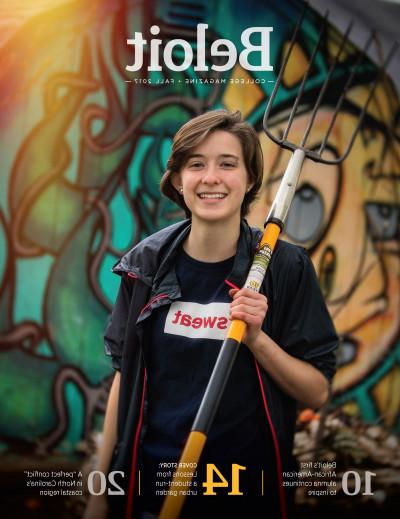20 Questions, Two Civilizations, Game Changer
Asking Questions

In reading this article, I find myself reflecting on how much Beloit has played a role in my professional development. If you had asked me about my experience in the years immediately following Beloit, I would have said that, like some respondents to the recent survey, my most valuable learning experiences happened off campus at the job I had at Helping Urban Beloit (HUB) for four years. I worked for an after-school mentor program for middle and high school students. I would have also shared that I felt alone in this experience and wished there was a greater connection between the college and the town.
However, looking back, I remember my FYI experience with classics professor Kosta Hadavas and the connections and learning that happened there that wouldn’t have happened otherwise, as I was a sociology and theatre major. I also think about classes with Catherine Orr (critical identity studies) who challenged students’ thinking and helped me make connections between the theoretical work of feminism to “doing the work” daily at HUB. Professor Rod Umlas’ classes brought theatre alive for me in ways that I continue to use in my therapeutic work as well as through his script analysis class that fostered critical thinking.
Today when I am having conversations about my work and the challenges of creating inclusive space, it is with friends from Beloit. We question each other, we want to continue to improve, and I am happy to know Beloit is on the same path.
Carrie Russell’02
Seattle, Wash.
Two Civilizations

I enjoyed “Confucius Flipping the Classroom” with Rob LaFleur. Many years ago, when he was in graduate school at the University of Chicago, I took his extension course in Chinese Thought, where Confucius came alive.
In the mid-20th century, Beloit’s famed non-traditional language classes were just emerging: Russian was offered as the Cold War was freezing up. Greek and Latin attracted a few; French, German, and Spanish were well under way. I botched a talk on Dostoevsky’s Crime and Punishment in Professor Fred White’s European Literature class but atoned eventually by taking up Russian. In Chinese Civilization class with Professor “Woody” Johnson, we broached the mysteries of that far-off place and time.
In August 1991, my wife, son, and I found ourselves in Beijing waiting for the Russian frontier to clang open after Gorbachev’s temporary arrest. We straddled the two civilizations I had first encountered at Beloit. We had taught English two years in China, observed remnants of Confucian behavior, visited a Confucian temple in Yunnan province, and watched the occupation of Tiananmen Square and subsequent massacre on TV from our academic post near Chongqing. Later, we were heading for Moscow and St. Petersburg where I had once taught in high schools on an exchange program. Students in then-Leningrad, hearing of my interest in Dostoevsky, had arranged a field trip to all the Crime and Punishment places in the city. Rob LaFleur, Confucius, and Dostoevsky live!
Stan Moore’51
Park Forest, Ill.
A Book Excerpt: Game Changer
…. [Basketball Coach Bill] Knapton had one true north: Do what’s right for the game. He never had a killer winning instinct—in fact, he said he found the stresses of competition to be negative. Instead he loved the planning for the game (the X’s and O’s) and the practices with the kids. He won a lot, but for him the real victory was the integrity of the sport.
And so it seems fitting and proper that, in the mid-80s, it was he who cast the deciding vote, in the Rules Committee of the NCAA, in favor of allowing the three-point shot—the celebrated trey, or what Marv Albert the announcer immortalized as the shot from “downtown.” The committee had been deadlocked 6-6 until the distance was lengthened enough for Bill Knapton to sign on. He switched his vote. The trey became permitted. Watching a basketball game now, without it, would be almost like watching baseball without permission to steal a base or football without the possibility of a Hail Mary.
Reprinted with permission from When You Could Only Dribble Once: 51 Famously Forgotten Game-Changers, the latest book by Professor Emeritus of English Tom McBride. Bill Knapton coached men’s basketball at Beloit to great acclaim from 1957-1997, guiding Beloit to 31 winning seasons.



